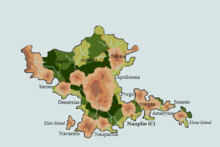Nauplio
| Despotate of Nauplia Δεσποτάτο της Ναυπλίας
|
||||||
|---|---|---|---|---|---|---|
|
||||||
| Motto: «Ο σκοπός αγιάζει τα μέσα» | ||||||
| Anthem: «Εμβατήριο των γαλανοχιτώνων» | ||||||
| Capital | Nauplio | |||||
| Largest | Sounio | |||||
| Official languages | Carian Greek | |||||
| Ethnic groups | Carian 99.5%, Other 0.5% | |||||
| Demonym | Naupliot | |||||
| Government | Constitutional Monarchy | |||||
| - | His Majesty, the King | Erichthonius II | ||||
| - | 10 Exarchs | Periandros Falaggitis, Ioannis Karavokiris, Nikodimos Andreopoulos, Tasos Papadopoulos, Kostantinos Ioannou, Theodoros Petropoulos, Athanasios Doukas, Diephobos Nikitaras, Athena Elaiopoli, Niki Politi | ||||
| Legislature | Vouli (Parliament) of the Naupliots | |||||
| - | Upper house | Gerousia (Senate) | ||||
| - | Lower house | Ethnosinelefsi (National Assembly) | ||||
| Establishment | ||||||
| - | Carian War of Independence | 1770-1775 | ||||
| - | Carian Revolutionary War | October-December 1954 | ||||
| - | Carian Civil War | 1954-1955 | ||||
Flag and Arms of Nauplio The Flag of Nauplio derives from many different periods of Carian history. The central emblem features Minerva, the patron Goddess of Nauplio in the Caric Exatheon, surrounded by branches of an olive tree, her sacred plant, which are gold to symbolize that Nauplio is ruled by a Monarch. The emblem is surrounded by a golden circle which connects to a golden cross while the field on the back of the flag is blue, a remnant of the the gold cross on blue filed flag of the period when Nauplio, like the rest of Caria, was made up of Autonomous Duchies under Eiffellander vassalage. The rulers had been force to adopt Christian symbols, while neither they nor almost any Carians were Christian. After Nauplio and all of Caria regained their independence, the symbols of the Caric Exatheon were brought back while the symbols of a whole period of Carian history, one that brought industrial and institutional modernization, have been retained.




